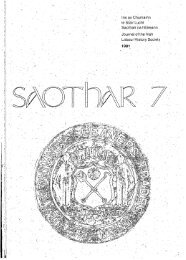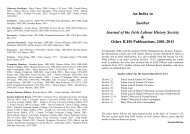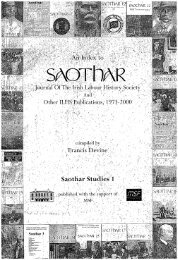92 SAOTHAR 13socialists of Irish origin often developed a dual-identity, they owed their basic loyalty to the politicalobjectives of the Scottish labour movement as they understood them.Far from Roman Catholic historians challenging the dominant Scottish historiographical orthodoxy,they have usually, if unwittingly, reinforced it. Thus in The Irish in Modern Scotland. Handleysaid: 'Even in the mining industry ~ where grading according to skill did not enter and where theimmigrants were numerically very strong, they failed to make their voice heard and left the leadershipto Scotsmen such as Alexander MacDonald, Keir Hardie and Robert Smillie' .18 He was factually wrongabout Smillie. An Ulster Protestant who wasbom in Belfast in 1856, Smillie came to live and workin Lanarkshire when he was fifteen years of age. 19The renaissance of Scottish working class radicalism took place against an immediate backdrop ofracial tensions and ethnic conflict within most working class communities. This was particularly thecase in Lanarkshire. In July 1877 Alexander MacDonald attempted to re-organise the miners' tradeunion branches in Lanarkshire and Ayrshire. Reporting on MacDonald's failure, the editor of theGlasgow Sentinel. the Scottish miners' newspaper, said that 'a large number of the men had gone to theOrange demonstrations'.20 In moving a vote of thanks to Alexander MacDonald, the veteran Labourleader, ata miners' meeting in Larkhall in 1879, the young Keir Hardie compared MacDonald's workfor the Scottish miners to that of 'Martin Luther at the rise of Protestantism '. Most of the miners presentwere Roman Catholics and the meeting ended in uproar. As William Stewart explained: 'There wereloud murmurs of disapprobation, and Hardie had actually to be protected from assault' YIn a pioneering essay on 'Irish nationalism and radical politics in Scotland, 1880-1906' , Ian S. Woodsays that 'modem work on Irish-American nationalism serves to underline the fact that people with nodirect personal memories of the homeland may develop even deeper politically expressed loyality toit, whether as a result of parental example or the influence of an immigrant sub-culture'.22 While theUlster Protestants appear to have integrated themselves into the dominant culture without too muchdifficulty, the hostility directed at the Irish-Catholic immigrants stimulated them to create their ownsub-culture in Scottish working class communities. This immigrant sub-culture overlapped with andimpinged on a predominantly Presbyterian culture throughout working class Scotland. Significantly,Roman Catholicism in Scotland was, as Anthony Ross argued, austere and puritanical. But the IrishCatholic immigrant'" sub-culture was most visible in the sphere of Scottish working class politics.Born of Irish immigrant parents in a slum in 'Little Ireland', John Leslie (1861-1921) became themost prominent socialist in Edinburgh. This role was held initially by the erratic John L. Mahon. Thelatter left the SDF in 1884 to join the breakaway Socialist League founded by William Morris, thoughhe re-joined the SDF later on. A socialist missionary in the Scottish coalfields, Mahon did not attachso much importance to the Irish Question as John Leslie or R. Chisholm Robertson. Like Leslie andConnolly, Mahon was born in the Cowgate or 'Little Ireland' area of Edinburgh. As David Roberts.the Catholic historian, wrote: 'He was baptisedatSt. Mary'sRC Cathedral on 2July, 1865. The additionof the name Lincoln is interesting and one presumes it derives from Abraham Lincoln assassinated on15 April ofthat year. This shows that McMahon's parents were very politically minded because it wasnot usual for Catholic children to receive such names in the nineteenth century'. Later on, he droppedthe Mc from his name. Unlike other Irish-Catholics who were prominent in Scottish working classpolitics, Mahon, though a practising Catholic in the late nineteenth century, did not lecture on the IrishQuestionYWhile the sons of Irish immigrants such as ConnoUy, Leslie, Mahon and Douglas 24 were active inEdinburgh, Chisholm Robertson and Hugh Murin25 in Stirlingshire, J. Shaw Maxwell, Pete Curran andJohn Wheatley in Glasgow, the real political stronghold of the Irish-Catholic immigrants was alwaysin Lanarkshire. 26 A key figure in the Lanarkshire coalfields was the miners' leader, Andrew McCowie;and in the 1870s the Glasgow Sentinel and the North British Daily Mail were constantly reporting thespeeches and activities of the man they depicted as 'the Scoto-Irishman'. McCowie - sometimes speltMcCowey - worked amongst the Irish immigrants in the Lanarkshire coalfields with another IrishCatholic miners' agent, James Roden.
ESSAYS 93McCowie played a key role in the birth of Scottish socialism. With the death of AlexanderMacDonald in 1881, McCowie, 'an enthusiastic Scoto-lrishman, thought he saw in William Small(1847-1903) a successor to Mr. MacDonald'.27 A member of the SDF, the Socialist League and theIndependent Labour Party (ILP), Small was a pivotal figure in Scottish trade union and socialist circlesuntil his death. Supported by John Ferguson, an Ulster born Protestant nationalist, and John Murdoch(1818-1903), the Scottish crofters' leader whose five volume manuscript autobiography I found inGlasgow in 1968, Small 'taught Keir Hardie and Robert Smillie the principles of socialism\28With Michael Davitt and rank-and-file Roman Catholic priests, Small toured the Lanarkshirecoalfields in 1884-85 setting up branches of the Scottish Anti-Royalty and Labour League. 29 Theillegitimate son of a wealthy Dundee manufacturer, Small was converted to Catholicism just before hejoined the SDF. 30 Furthermore, Small's prominence in the SDF, Socialist League and ILP did not vitiatehis warm and intimate relations with John Ferguson, John Murdoch, Chisholm Robertson or theCatholic priests who worked hard to organise the miners and unskilled workers in the West of Scotland.Indissolubly linked with the land agitations in Ireland and the Highlands of Scotland, the ScottishAnti-Royalty and Labour League agitated for the nationalisation of the land and mineral royalties. Incommon with John Ferguson, J. Shaw Maxwell,31 John Murdoch, Michael Davitt, ChisholmRobertson,32 Keir Hardie and Dr. Charles Cameron, the editor of the left-wing Liberal North BritishDaily Mail and MP for Glasgow ,33 Small was a passionate advocate of Home Rule for Scotland as wellas Ireland.Despite his lack of Irish ancestry, William Small became increasingly identified with the Irishimmigrants in Scotland. When the Irish National League extended its political activities in Scotland,Small, Chisholm Robertson and other Irish immigrants articulated their double-identity as Scots andIrish sympathisers. In its opening issue in 1885, the Glasgow Observer approved of the efforts of theIrish National League to mobilise the Irish vote in the cause of Home Rule for Ireland. 34 But theGlasgow Observer did more than that; it also helped to organise Irish immigrants and native Scots intonew trade union and labour organisations, and became the voice of the Irish-Catholic immigrants in theWest of Scotland. In 1885, for example, the Glasgow Observer published an article byWilliam Smallon 'A New Labour Movement' .35 At the same time, Small, Michael Davitt, and Chisholm Robertsonorganised branches of the American organisation, the Sons of Labour, in the Lanarkshire coalfields.RObertson, a young electrical engineer in Slammanan, canvassed 'the Irishmen of the locality' whowere interested in forming a branch of the Irish National League; and he gave a lecture in Glasgow onthe question, 'Should an Irishman be ashamed of his nationality?' .36In the general election of 1885 Small, Chisholm Robertson,37 J. Shaw Maxwell, J.G. Weir, BruceGlasier and others devoted equal attention to the agitation for Home Rule in both Scotland and Ireland.Yet despite their double-identity as Scots and Irishmen, Robertson, John Leslie, Andrew McCowie; J.Shaw Maxwell and John L. Mahon owed this basic allegiance to organised labour. R. ChisholmRobertson made this crystal clear when the leaders of the Irish National League in Glasgow asked,theIrish electors to vote for the Liberal candidate, R. Caldwell, against J. Shaw Maxwell, the Land andLabour candidate in the Blackfriars constituency. In Slammanan Robertson persuaded the IrishCatholic activists to pass the following resolution:'That we, the members of the Daniel O'Connell branch of the Irish National League, deeply regret theaction of the executive in withdrawing the Irish vote from Mr. Shaw Maxwell, the candidate for theBlackfriars division of Glasgow, and that the motion be sent to the Glasgow Observer for publication. '38In those years, Chisholm Robertson, later to be the first secretary of the ILP, was a passionate socialistwho was proud of his dual-identity as a Scot and an Irishman.By 1895 an increasing minority of the Irish-Catholic immigrants were arguing for the nationalisationof the means of production. In supporting the ongoing agitation for the nationalisation of the landand mineral royalties, Catholic priests were now creating problems for themselves. As well as
- Page 1 and 2:
JOURNAL OF THE IRISH LABOUR HISTORY
- Page 3 and 4:
ContentsPageEditorial: Labour Histo
- Page 5 and 6:
EDITORIAL 3freedom to participate i
- Page 7 and 8:
CorrespondenceThe Irish Labour Part
- Page 9 and 10:
; ~ ; ,The Decline and Fall of Donn
- Page 11 and 12:
THE DECLINE AND FALL OF DONNYBROOK
- Page 13 and 14:
THE DECLINE AND FALL OF DONNYBROOK
- Page 15 and 16:
·' THE DECLINE AND FALL OF DONNYBR
- Page 17 and 18:
THE DECLINE AND FALL OF DONNYBROOK
- Page 19 and 20:
THE DECLINE AND FALL OF DONNYBROOK
- Page 21 and 22:
THE DECLINE AND FALL OF DONNYBROOK
- Page 23 and 24:
THE DECLINE AND FALL OF DONNYBROOK
- Page 25 and 26:
,'-,;-''''.A PASSAGE TO BRITAIN 23C
- Page 27 and 28:
A PASSAGE TO BRITAIN 25only in the
- Page 29 and 30:
A PASSAGE TO BRITAIN 27clothing._De
- Page 31 and 32:
A PASSAGE TO BRITAIN 29established
- Page 33 and 34:
;:-.",.- .. .", ...... '.:. '
- Page 35 and 36:
LOUIE BENNETI 33feminist movement w
- Page 37 and 38:
:... ~: ."
- Page 39 and 40:
-.- '.LOUlE BENNETT 37While there i
- Page 41 and 42:
LOUIE ~ENNEIT 39Xl's encyclical Qua
- Page 43 and 44: LOUIE BENNEIT 41Bennett's own relat
- Page 45 and 46: LODIE BENNETT 43109; IWWU resolutio
- Page 47 and 48: Essays in ReviewCosherers, Wanderer
- Page 49 and 50: ••• .".'. >. '~"ESSA YS IN RE
- Page 51 and 52: ESSAYS IN REVIEW 49ConnolIy:Myth an
- Page 53 and 54: ESSAYS IN ~EVIEW 51tion' in the Int
- Page 55 and 56: ESSAYS IN REVIEW53International:'I
- Page 57 and 58: REVIEWScontroversy is real history.
- Page 59 and 60: REVIEWSJoe Monks was among the earl
- Page 61 and 62: REVIEWSnolly-Column Song','Proudly
- Page 63 and 64: REVIEWSresulting from the arrival o
- Page 65 and 66: REVIEWS,63the book by means of an a
- Page 67 and 68: REVIEWSlogue, it is hardly surprisi
- Page 69 and 70: The Team For All Workers ...CULIAIB
- Page 71 and 72: ESSAYS 69mission and moral refonn.l
- Page 73 and 74: .. ...... ~.~ -~ .'- '.ESSAYS. 71fr
- Page 75 and 76: ESSAYS 73claimed authority but whic
- Page 77 and 78: ESSAYS 75provided the basis for soc
- Page 79 and 80: ESSAYS 779. For comparisons see E.T
- Page 81 and 82: ESSAYS 7952. Annals of Christ Churc
- Page 83 and 84: ESSAYS' 81Fianna Fail and the Worki
- Page 85 and 86: ESSAYS 83Eireann in 1925 visibly di
- Page 87 and 88: ESSAYS 85recognition of the impract
- Page 89 and 90: ESSAYS 871970, it created the condi
- Page 91 and 92: ESSAYS89The Irish Immigrants' Contr
- Page 93: ESSAYS" 91Although anti -Catholic p
- Page 97 and 98: :. -,,'.' ',. .~.,:.ESSAYS 95Althou
- Page 99 and 100: ESSAYS 97young girl of their own ba
- Page 101 and 102: SourcesIrish Labour History Society
- Page 103 and 104: SOURCES 101INovember, 1971 to no. 1
- Page 105 and 106: SOURCES 103would claim credit for t
- Page 107 and 108: SOURCES105Sources for Irish Labour
- Page 109 and 110: SOURCES 107NorthWest Archives and L
- Page 111 and 112: SOURCES 109In 1966 the Finnish gove
- Page 113 and 114: TURNINGANEWLEAFThe CPSSUis the larg
- Page 115 and 116: REMINISCENCE 113us due to my politi
- Page 117 and 118: REMINISCENCE 115when Jim was presen
- Page 119 and 120: REMINISCENCE 117of Dail Eireann. 17
- Page 121 and 122: REMINISCENCE 119NotesThe above arti
- Page 123 and 124: DOCUMENT STUDY 121James Connolly in
- Page 125 and 126: DOCUMENT STUDY123SOCIAL DEMOCRATIC
- Page 127 and 128: DOCUMENT STUDY 125proletariat of th
- Page 129 and 130: DOCUMENT STUDY 127the support of Je
- Page 131 and 132: DOCUMENT STUDY 12926. The Workers'
- Page 133 and 134: 131BibliographyA Bibliography of Ir
- Page 135 and 136: BIBLIOGRAPHY 133Compton, P.A. Demog
- Page 137 and 138: BIBLIOGRAPHY 135Levine, I. and Madd
- Page 139 and 140: BIBLIOGRAPHY 137Turner, M. 'Towards
- Page 141 and 142: BIBLIOGRAPHY 1394. Land and Agricul
- Page 143 and 144: BIBLIOGRAPHY 141Clogher Record12 (2
- Page 145 and 146:
BIBLIOGRAPHY 143Political Research
- Page 147 and 148:
BIBLIOGRAPHY 145Pres, 1987.O'Brien,
- Page 149 and 150:
147Notes on Contributorsf onathanBe
- Page 151 and 152:
1901: Ireland's first general union
- Page 153 and 154:
ELECTRICAL TRADES UNION .Establishe





